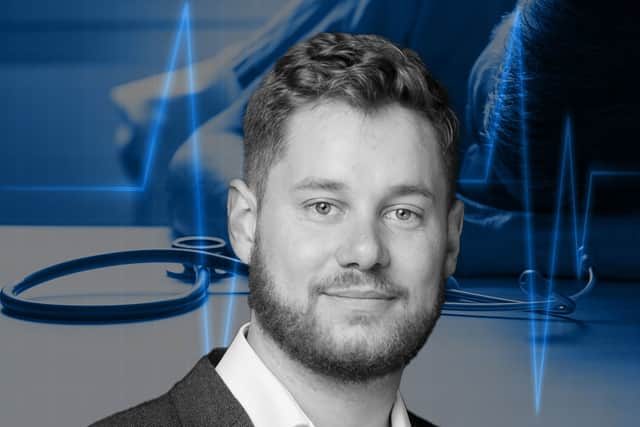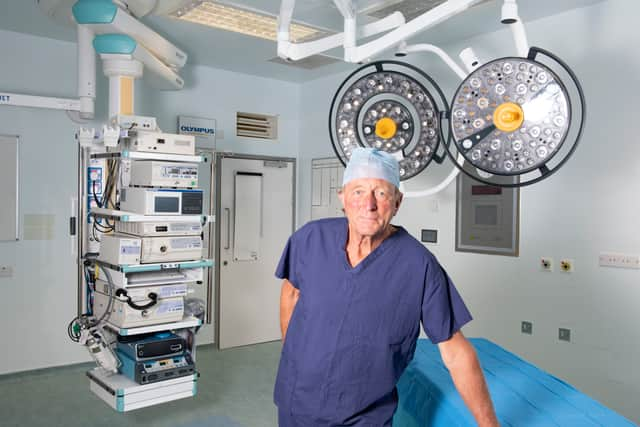NHS: the ‘burnout epidemic’ among hospital staff will ‘worsen in winter’ if changes are not made, says A&E doctor
This article contains affiliate links. We may earn a small commission on items purchased through this article, but that does not affect our editorial judgement.
and live on Freeview channel 276
The “burnout epidemic” among healthcare workers in hospitals will “worsen” as winter approaches, an A&E doctor has said.
Dr Kit Latham, 35, said working as a doctor in an emergency department is an “incredibly stressful role”, with shifts not only being long and busy, but also “completely unpredictable”.
Advertisement
Hide AdAdvertisement
Hide AdHe said: “You never know when you might be suddenly called to deal with a major incident or cover a night shift, and there’s an expectation that your own wellbeing should take a backseat when patients are in need.
“This is not a sustainable way to work, and it’s fuelling a burnout epidemic in hospitals.”
This comes as a study published in the BMJ suggested that patients being treated by exhausted doctors may face additional risks when they receive care.
The new review found that doctors experiencing burnout are twice as likely to be involved in patient safety incidents such as medication errors and “suboptimal care”.
Advertisement
Hide AdAdvertisement
Hide AdPatients are also less likely to be satisfied with the treatment provided by such medics, with the link between burnout and patient safety incidents being highest among younger doctors and emergency medicine physicians.


Dr Latifa Patel, chair of the BMA representative body, said the report “will not be a surprise to doctors and medical students”.
She added that burnout is not just a question of personal wellbeing or career satisfaction, but a matter of patient safety, saying that “tired, undervalued and understrength doctors cannot work to the best of their abilities and these figures throw into disturbing relief what that means for patient care”.
But Dr Latham said that due to staff shortages and “serious flaws” in the hiring and onboarding process for new doctors, the problem of burnout “looks set to worsen as winter approaches”.
Advertisement
Hide AdAdvertisement
Hide AdThis lengthy hiring process y led the doctor to co-found Credentially, which aims to reduce pre-employment checks from 60 days to five days so that new doctors can start working on wards faster.
The World Health Organisation (WHO) recently launched a report examining workforce issues, and found that across Europe there are on average 37 doctors for every 10,000 people. But in the UK this figure is just 30.4, placing it between Ukraine and Moldova in the number of doctors per population.
Dr Hans Kluge, the WHO’s regional director for Europe, said: “Tackling the health and care workforce crisis is absolutely critical.”
He added that workforce gaps were a “ticking time bomb”.
Addressing why burnout among doctors seems to be getting worse, Dr Latham said due to the pandemic aftermath, record-breaking waiting lists, a workforce exodus and the onset of winter, “the pressure on healthcare systems has never been greater”.
Advertisement
Hide AdAdvertisement
Hide AdHe added that doctors, nurses and their colleagues are “all working incredibly hard” to deliver the best possible care to patients, but it “often feels like they’re expected to work miracles with extremely limited resources and capacity”.
Alongside this, healthcare staff “are having to face the same cost-of-living pressures as everyone else”, with stress about affording energy bills and food costs “making their mental and physical burnout much worse”, he said.
What can be done to help?
Leaders and politicians “need to act now and take immediate steps to halt the burnout crisis,” said Dr Latham, who added: “There’s no single cure, but there are several small interventions that would make a huge impact in just a few weeks.”
Reducing the behind-the-scenes workload being piled on healthcare teams, such as the amount of time and effort “spent completing repetitive admin tasks”, which takes resources and time away from patient care, and makes waiting times even longer, would be a “good place to start”, said Dr Latham.
Advertisement
Hide AdAdvertisement
Hide AdProf Neil Mortensen, president of the Royal College of Surgeons of England said: “Surgeons and surgical teams have had an incredibly tough couple of years and we are aware of high levels of stress and burnout.”
He added that in order to maintain standards of care and patient safety “we must do what we can to support those working tirelessly within the profession”.
He said colleagues of all grades need to be happy in their jobs, and feel supported, appreciated and fulfilled, otherwise there is a risk they will leave the NHS, or decide to work abroad, which will “further exacerbate staff shortages”.
Prof Mortensen said one of the factors that needs “urgent action” is to reform NHS pensions and prevent the “haemorrhage of senior staff”.
Advertisement
Hide AdAdvertisement
Hide AdHe explained that 69% of surgeons have reduced the amount of time they spent working in the NHS as a direct result of changes to pension taxation rules and is therefore urging the Government to act fast to resolve this issue.
“Without a workable arrangement for keeping senior surgeons and anaesthetists in the workforce to allow evening and weekend working, there is only a slim chance of making a significant impact on the massive planned surgery waiting lists,” Prof Mortensen said.
He added: “It’s also essential that we have enough staff to meet patient demand now and in the future. That is why we have consistently called for a clear workforce strategy. The Department of Health commissioned NHS England and Health Education England to undertake this, and it must be published as soon as possible.”


The Department for Health and Social Care said the Deputy Prime Minister and Health Secretary, Therese Coffey, is “focused on delivering for patients” and has set out her four priorities of ABCD - ambulances, backlogs, care and doctors and dentists, with £39 billion being invested to tackle these challenges.
Advertisement
Hide AdAdvertisement
Hide AdThe DHSC said it is taking action to protect patients and has appointed the first ever Patient Safety Commissioner, who will provide a “voice to patients” relating to the safety of medicines and medical devices.
Comment Guidelines
National World encourages reader discussion on our stories. User feedback, insights and back-and-forth exchanges add a rich layer of context to reporting. Please review our Community Guidelines before commenting.
